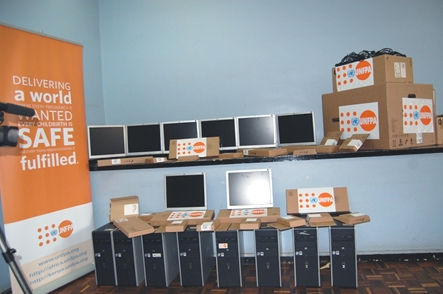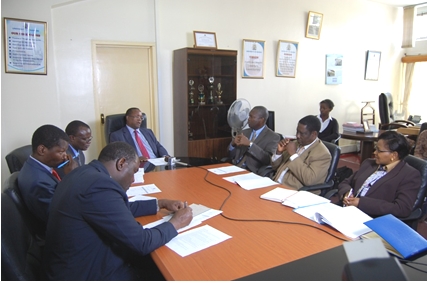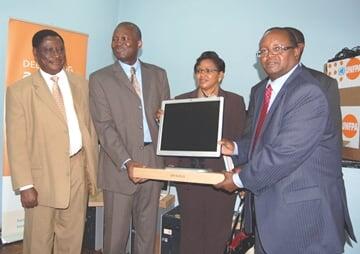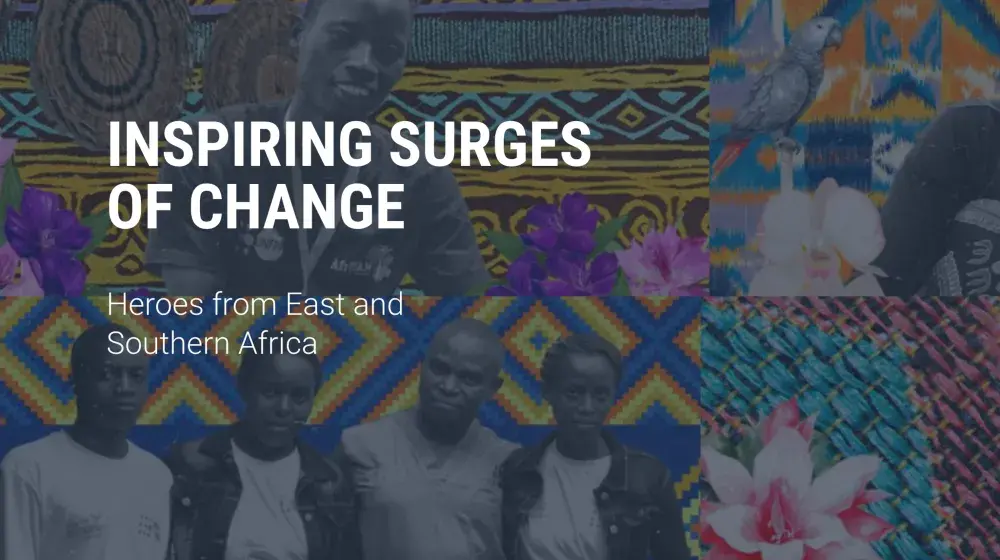The Government of Kenya must find ways to use the extensive data collected and compiled by the highly qualified researchers at the University of Nairobi's Population Studies and Research Institute (PSRI). This was said by UNFPA East and Southern Africa Regional Office Director, Mr. Bunmi Makinwa, on the handing over of eight high-tech computers to the Institute to strengthen its capacity.
"Kenya is one of the few African countries on the continent that is a role model in the conducting of population censuses," said Mr. Makinwa. "UNFPA supported Kenya's 2009 population census and we are very happy with the way it was conducted and with how the results were analyzed."
UNFPA mobilized resources worth US$4 million to support Kenya's population census.
"UNFPA understands the importance of using population data for development planning and this is why we have been supporting PSRI, which provides technical support to Kenya’s National Bureau of Statistics," said Mr. Makinwa. "We shall continue supporting and working with PSRI."
A key function of PSRI is teaching and research in support of the Government’s human resources capacity needs and providing information for planning.
Mr. Makinwa urged the Kenyan Government to make use of the data and research findings compiled by PSRI when formulating policies and development action plans for the country.


|
"PSRI must encourage information and knowledge sharing with NGOs and the business community," Mr. Makinwa advised. "I believe these interlinkages are very important because for any meaningful success to be realized in social, economic, political, cultural and national development, current data, statistics and other research findings on population patterns and behaviour are critical. This information is also very important for development partners to help them successfully implement their projects," Mr. Makinwa added.
Forming long-lasting inter-linkages that are inter-dependent on each other would further ensure the profitability and sustainability of PSRI, KNBS and similar national research agencies.
"When the Kenyan Government, the business community and development partners begin to appreciate research and start to depend on it when designing their policies, plans and programmes, then PSRI will grow as an institution and become profitable from its work," said Mr. Makinwa.
Dr. Benjamin Alli, UNFPA's Representative in Kenya urged PSRI to seek beneficial partnerships that will enhance their overall capacity in the areas of teaching, research, monitoring and evaluation.
"The consignment of computers we have donated today will particularly enhance the capacity of the staff and students of PSRI to fulfill their duties. This donation is part of our larger support to PSRI over the years, which we shall continue," Dr. Alli pledged.
PSRI Principal, Prof. Enos Njeru, thanked UNFPA for its ongoing support.
"UNFPA is one of our major partners and we have been able to accomplish numerous projects with their support," he said. "UNFPA has provided us with computers before and though they are still in use, they are now very old. But with these new high-tech computers, PSRI shall become a digital institute. We shall now be able to post our work online. This partnership will be appreciated worldwide in keeping with the world-class status of the University of Nairobi," he added.


|
PSRI Director, Prof. Lawrence Ikamari, lauded UNFPA for supporting the Institute’s work and for developing their capacity, which has enabled heightened research methodologies. “Right from our inception in 1976, UNFPA has been one of our major sponsors,” he said. “PSRI was incorporated into UNFPA Kenya’s Second Country Programme as one of its core implementing partners. The support from UNFPA has, for instance, assisted PSRI to enhance the capacity of its staff. Thus far, staff development has been realized through the provision of fellowships to students to pursue PhD and Master’s degrees.
“UNFPA also donated a vehicle to PSRI in 1991 and it is the only vehicle we have to date. Furthermore, one of our key successful projects was the establishment of the Demographic Surveillance Site at Rusinga Island in 2001, using seed money from UNFPA during the Fifth Country Programme. It is now time to revise this site and we are looking towards UNFPA for this,” Prof. Ikamari appealed. In addition, UNFPA has in the past provided resource materials for use in the PSRI library.
Prof. Ikamari expressed the University’s gratitude for the support received thus far from UNFPA.




